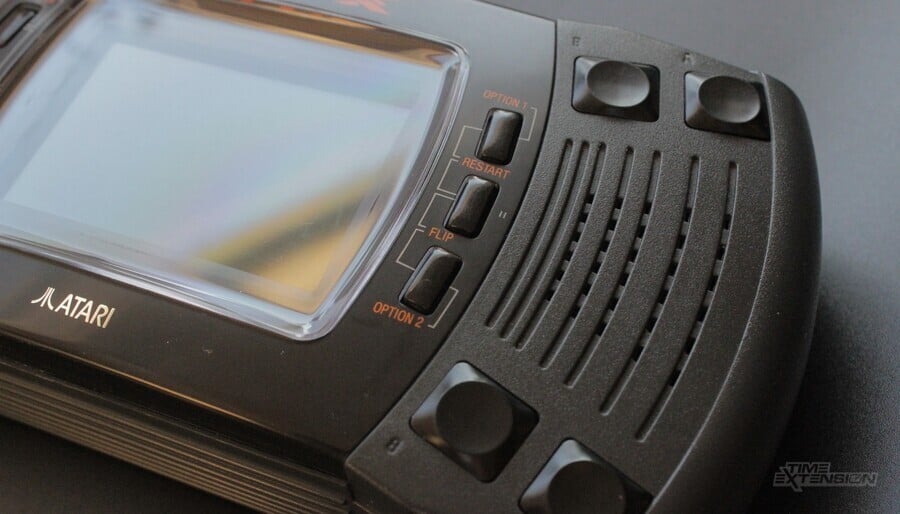
In the late 80s and early 90s, Lawrence Siegel had the unenviable task of turbo-charging Atari's software development, at a time when Nintendo had a monopoly on the market.
Siegel was a veteran of the games industry, having started his career way back in 1972, working at the British arcade manufacturer Alca in Oldham, in Greater Manchester. From there he went on to take roles at the Sega-owned venture Segasa in Parla, Madrid, as well as WMS Gaming, Stern Electronics, and Seeburg, before starting his own company Memetron, in 1983, focused on the importing and sale of arcade video games from Japan.
In 1987, Atari Corporation — a company formed out of Warner Communications' sale of Atari, Inc.'s assets — ended up acquiring Memetron, positioning Siegel as the new vice president of its video game software division. It charged Siegel with the goal of re-establishing Atari in the video game market and later even gave him the role of president of the Entertainment division. However, his time at the company was often characterized by a constant struggle to convince third-party developers to supply software for Atari's machines due to Nintendo's stranglehold on the industry, and frequent arguments with the Atari owner Jack Tramiel over the best way to grow the business.
Recently, Time Extension had the incredible opportunity to sit down on a call with Siegel to chat all about his lengthy career in games and his experience of working with the Tramiels. Below you'll find the discussion (edited for flow, clarity, and length).
Time Extension: At the time you joined Atari, it seemed like the company had been treading water for a long time. I’m just wondering, how did you come to arrive at Atari and what was your own opinion on Atari's situation when you joined?
Lawrence Siegel: I was living in Chicago and I had a development group of about 40 guys employed by me. I had a facility where I actually owned the building in a little town outside of Chicago called Lombard and we were doing contract development work for publishers. So Acclaim would come to me and say, ‘Would you make this game?’ Atari Games would come to me and say, ‘Would you work on this game?’ The various publishers at the time would give me games. And that company was called Memetron. That was in the late 80s.

Atari came to me at the time and Atari was owned by the Tramiel family. There was Jack Tramiel and he had three sons: Sam, who was the president of the company; Leonard, who was an engineer; and Gary, who was kind of a ne’er-do-well. They had bought Atari and pretty much all of its rights from Warner Communications when Atari collapsed. And Jack was the guy who had brought the Commodore computer to the marketplace: the C64.
In those days, the C64 was an innovative, imaginative computer — nobody had anything like it – and Jack didn’t have to have anything of a marketing arm. He would just come into the office in the morning, he’d pick up the phone, and it would be someone like, ‘Can I have 500 of them? Can I have 300 of them?’ People were ordering C64s, so Jack never really had to market the C64. It marketed itself. So when he acquired Atari, he came from that world of, ‘I don’t have to sell anything if I make it good. If I make a better Mouse Trap, they’ll beat a path to my door’. And he never really understood the difference between hardware and software. In other words, he always tried to make things cheaper. He was constantly trying to lower the price and gain market share.
Unfortunately, with the game business, it doesn’t work like that. Game consoles are sold based on the software that they offer and Jack couldn’t never come to grips with that. He was always sure it was the price. So anyway, in mid-87, he bought my company, Memetron, and he had me discontinue all the projects that I was doing for third-party software companies, which caused me a lot of angst. It bugged me a great deal. I had a couple of projects I was doing for Taito, which is a large Japanese company. I had a couple of products I was doing for EA. And I had one I was doing for Acclaim. I discontinued all the projects, gave him the software, and Atari started using my guys to make games for them.
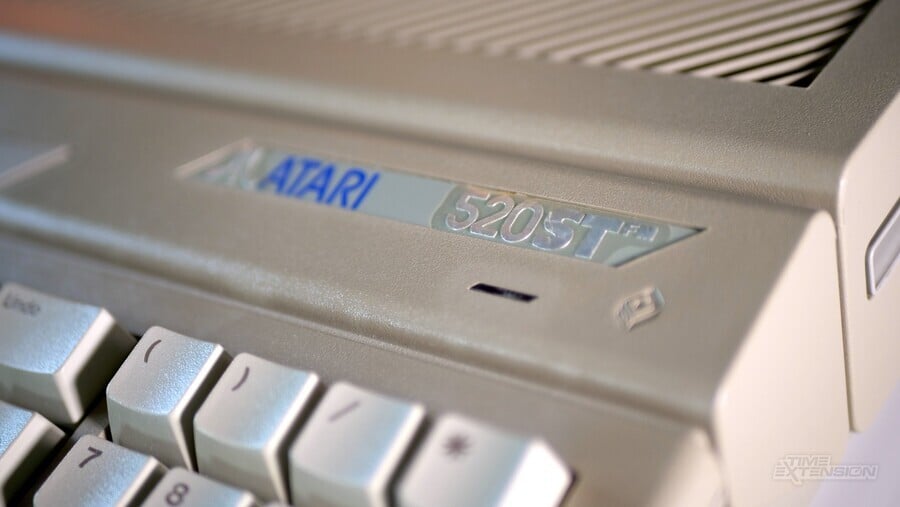
At the time, I was making games for the ST computer and I was making games for the Atari home system, which was the oldest one — the old relic. But Jack always wanted to build a new hardware system and I was like, ‘Just abandon it. Let’s just make software for Nintendo and Sega and everybody else. Those days are over.’ Jack couldn’t get to grips with that. He was also a guy who was sure that if he made the cheapest hardware system, people would buy it. It had nothing to do with the games that were on it. It was only about the cheapest hardware system because that was the school that he came from with the Commodore 64.
As a result, it was very difficult for me to work for him. After I started working for them, they fired the president of Atari, a guy named Mike Katz, who was a nice guy and felt pretty much the same way I did.
Time Extension: We’ve spoken to Mike before. One of the things we were actually going to ask you about was something Mike mentioned to us about Sega offering the Genesis to Atari to market in the US. He told us he proposed it to Jack Tramiel who turned it down. Do you remember anything about those events?
Lawrence Siegel: The Tramiels were an interesting group of people. They never missed an opportunity to miss an opportunity. If they could go the wrong way in the game business, they did. It was absolute consistency from the moment I met them. You couldn’t even guess as badly as they performed in the game business. They consistently went the wrong way. And yes, Sega did sit down with us and I was part of those meetings with Mike.
Mike and I are there for 3-4 days, and we come away with a deal for the Sega Genesis. We’re happy as clams. We fly back. And Jack says, ‘No fucking way! This is not for us.’ And it was a fabulous deal!
I will never forget that when Mike Katz and I flew into New York City [for those meetings], I had my secretary make a hotel reservation. Everyone was staying at the Waldorf, which at the time was a nice hotel — believe me, it wasn’t the finest hotel in New York but it was a nice hotel. Anyway, I go in and check into the hotel, Mike and I are there for 3-4 days, and we come away with a deal for the Sega Genesis. We’re happy as clams; we fly back. And Jack says, ‘No fucking way! This is not for us.’ And it was a fabulous deal! That deal would have really established Atari again as a real competitor and Nintendo was terrified that we were going to do that deal. Mike was the president and like I said, I had just come on board as VP of Software.
About a month later, the accounting department called me and they said, ‘We’ve deducted $307 from your expense account for going to New York.’ And I said, ‘What? What the hell!’ So the next time I was out in Sunnyvale, I said to Jack, ‘Hey Jack, why did you take $307 from my expense account? I was in there with Sega trying to get that deal which you shitcanned? I was there on business.’ He goes, ‘Larry, who the hell do you think you are?’ He says, ‘Why would you take that room?’ And I said, ‘What do you mean take that room?’ He said, ‘I saw the bill and your bill was like $51 more expensive than Mike Katz’s’. I was like, ‘Yeah, I wonder why. Who knows?’ He goes, ‘I’ll tell you why. Because you had a Park Lane view and you were on a high floor, and I’m not paying for that at Atari.’ I said, ‘Jack, I was there working my ass off for you for a week and you think you need to take $300 off my expense account. That’s what’s important to you. Not the fact that you just passed up the deal of a lifetime.’ But that’s the way their mind worked. It was all about saving six cents. It was not about the big picture; it never was at Atari with those guys. That was the tragedy.
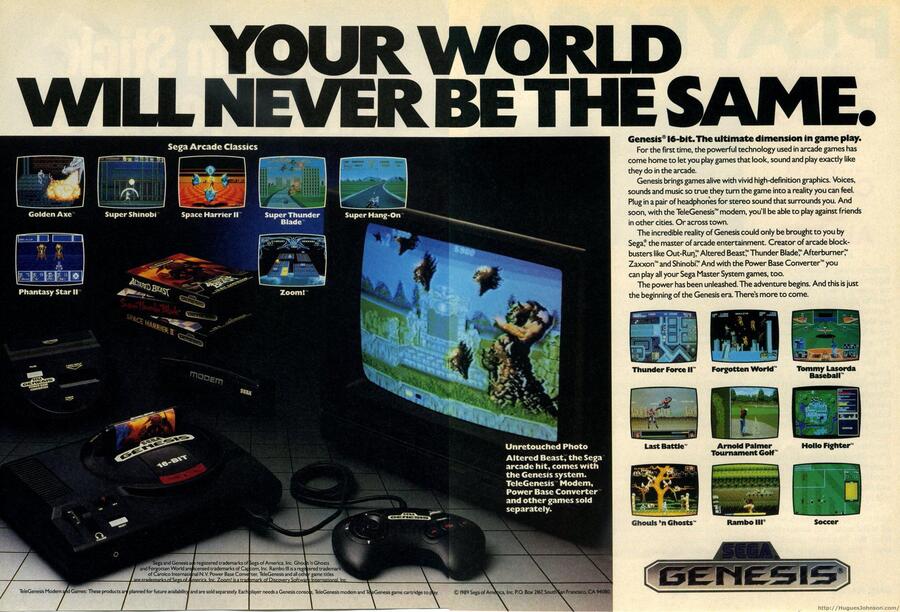
About 2-3 months later, they fired Mike Katz and they made another guy their president for six months and they didn’t like him, and then Jack called me and said, ‘Larry, you be the president’ and I said, ‘Okay’.
Time Extension: Instead of Sega, Atari ended up partnering with a company called Epyx to release the hybrid 8-bit/16-bit handheld the Atari Lynx in 1989. What were your opinions of the Lynx?
Lawrence Siegel: The Lynx was a fabulous little handheld. The problem was Nintendo wouldn’t let any of their third-party people come and do software. If you made software for the Game Boy or the Nintendo system you couldn’t put it on anybody else’s system. Sega had some of the Japanese publishers. Nintendo had the rest. And we had none. And in those days, the Japanese publishers ran the roost.
So we had this really cool colour item that was just a vastly superior item and it was relatively inexpensive. But I just couldn’t get any software for it and the Lynx failed because almost every piece of software for the Lynx I made in my office in Chicago. I don’t think we had half a dozen third-party publishers that might have made a few titles here and a few titles there. Nobody was able to make any titles for it. Every single one of those games I executive produced and it’s terrible. If you play the Lynx today, it still plays nicely.
Time Extension: You mentioned that Nintendo's third-party licensing program prevented other companies from working for Atari. In January 1989, Atari Corp ended up filing a $250 million lawsuit against Nintendo for violation of antitrust laws. Could you give us more information on how that came about? And what was the result of that for Atari?
Lawrence Siegel: The result of that lawsuit was Nintendo won. I kept going to Jack and kept saying, ‘Look, I’m blocked. I’m obstructed. There is no way that I can get any high-quality software from any of the third parties because Nintendo’s contract says if you put it on Nintendo, you can’t put it on anybody else’s for three years. I don’t have any of the hot software, because all the hot new movies that were coming out were giving their games to Nintendo, where they could have broad sales.’ So I said, ‘I’m blocked out of the marketplace.’
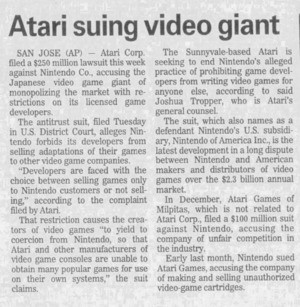
So Jack said, ‘Well, I’m going to sue those bastards.’ I said, ‘Jack, I’m not an attorney. I don’t know whether what they’re doing is illegal or not.’ But he certainly thought it was a violation of fair-trade laws and he brought it to San Francisco. And Jack did what Jack always did. He found the cheapest, lousiest law firm in the United States, which would take the case for the least amount of money. It was the children’s brigade against Nintendo, who had the most prestigious lawyers in the country.
I spent months in San Francisco in that trial and every day I’d go back to my room and I’d call my wife and I’d say, ‘Oh my god, we’re being slaughtered.’ I knew which way it was going to go. Everybody knew which way it was going to go, and it went that way. So the court determined that Nintendo had not violated antitrust laws by behaving that way.
I have to tell you, subsequent attorneys have looked at that and it has been the subject of countless reviews in recent years because free-trade laws have become somewhat important in the United States for a whole load of other reasons that we don’t need to go into. And people look at that and go, ‘Yep, Atari was poorly represented and should have won that lawsuit.’ And we should have.
Time Extension: Besides the Lynx, another piece of hardware that was in development during your time at Atari was the Atari Panther. This was a scrapped console that Atari was working on in the early 90s with a British company called Flare Technology and was designed to compete against the SNES and Sega Mega Drive. Can you tell us more about what you remember about that system?
Lawrence Siegel: Atari was constantly looking for hardware. You have to understand, Sam Tramiel was Jack’s son. He knew nothing about video games, knew nothing about commerce. He was just the nicest guy and a gross incompetent. I wouldn’t say a thing about Sam in terms of being a bad guy; he wasn’t. Jack was a miserable son of a bitch but Sam was absolutely a sweetheart and a very bright kid, but just had no clue and sat on his father’s knee and ‘Hardware! Hardware! Hardware! Make it cheaper! Make it cheaper and they’ll come and buy it.’ They never really understood that people buy these systems to play games that they like. That was just a total [enigma] to them.
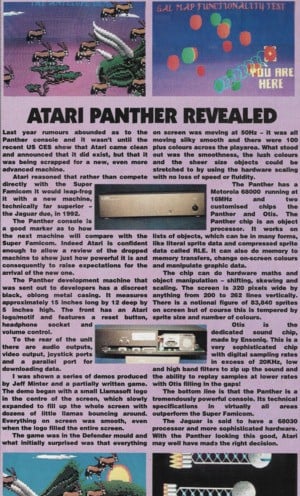
So they found this company in England called Flare, who had this hardware system called the Panther. It was Lynx all over again. ‘Sam, there’s no games. It’s suicide. I don’t want to be here for this. I don’t want any part of this.’ Sam and Jack were adamant that it was this, that, or the other. And not only that, but, ‘You’re not going to spend a dollar marketing it because you believe if you put it on the market at $49 and all the other game systems are at $149, they’re going to buy the Panther and that’s not the case.’
They kept saying, ‘Move back to Northern California, move back to Northern California, we’ll have somebody else run the programmers you have in Chicago.’ And I said, ‘No’ and then in 1992, before they were going to do the [Jaguar], I quit. And then I moved back to California anyway. I didn’t want to work for them anymore. I was just up to my eyeballs in their shenanigans. So in late ’92 — I don’t remember exactly when — I quit Atari and started another business called Black Pearl Software. And then a third-party software publisher a year later bought that business from me and they were in California, so I moved my whole operation to California. That was THQ. I started doing games again. I started doing independent games and they were hiring me to do software.
But I will tell you the most fun I had at Atari was not with Atari games, it was with the ST. Because the ST computer was really a cool computer. Especially if you were a music goof with the MIDI ports. We used to compete with Amiga. Amiga was making games; we were making games. We were really the only PC-type games in the marketplace at the time and that was more enjoyable because I didn’t have to fight the battle of getting the licenses. Because in the PC world, nobody cared.
Time Extension: I’ve read that there were already people making games for the Atari Panther. What do you remember about that?
Lawrence Siegel: Flare had reached out to a few developers and had made some favourable relationships with them, and then Atari acquired the rights to Panther from Flare. I went to Sam and said, ‘Look, there’s no chance we are going to take [this small group of studios] and we’re going to compete with the 20 big guys from the titans of the industry out of Japan and the US: the Acclaims and the Electronic Arts and the Activisions.’ I said, ‘There’s no way. This is a suicide mission. And yes, one of those guys could make a really good game, but building a franchise takes years and we don’t have a Sonic and we don’t have a Mario. We need a backbone title. We need an anchor for this entire project and we don’t have it.’
They worshipped the gods of hardware, not the gods of software, and that doesn’t work in the games business. So I just knew that the Panther, and the Jaguar, and all of this stuff, it was stillborn in the marketplace. It just never had a chance.
And those guys I went to them and I said, ‘You’re doing this speculatively and we’re giving you a really good deal’ and we did. Flare had given them a good deal and Atari had agreed to abide by the terms that Flare had said. I don’t know if I met with them individually or I met with a couple of them, but one of the reasons I left Atari is that I was so disillusioned that I saw failure with the Panther all over again. This was déjà vu with the Lynx. I was not there when the [Jaguar] came out. I knew that no matter what unless there was a dramatic sea change with the people who owned Atari at the time, which was the Tramiels, there was not a chance of there being success. They worshipped the gods of hardware, not the gods of software, and that doesn’t work in the games business. So I just knew that the Panther, and the Jaguar, and all of this stuff, it was stillborn in the marketplace. It just never had a chance. None of this stuff had a chance.
Jack could have got some backbone titles for projects and we never did. When Jurassic Park was a book — it hadn’t even become a movie yet – I came in one day and handed the book to Jack and Sam, and said, ‘Read this’. Then a week later, I said, ‘That’s going to be a movie. This is going to be big. This is something we should go get.’ I had a deal not only for the movie rights but the t-shirt rights and the hat rights for a million-dollar down payment and 6% on everything and those guys turned it down. And I realized that they would never spend the money to have an anchor title.
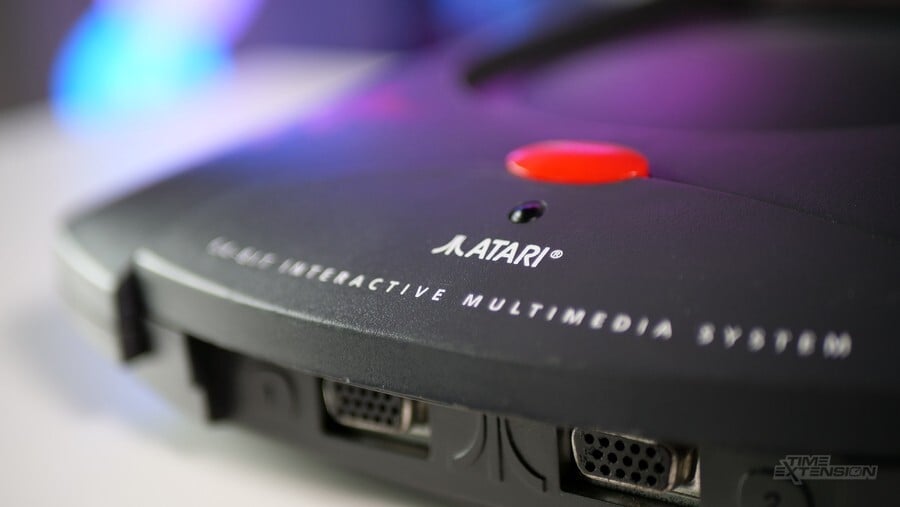
Now, would we have signed that contract? I can’t say we were ready to sign. But I certainly had discussions with them and we were certainly working towards a great arrangement. But I was shut down. It was, ‘We’re not going to spend that kind of money.’ So maybe in American terms, I was on second base and halfway to third when they shot me down. With Sega, when I was with Mike Katz and we were pursuing the Genesis, we were on third base and we were on our way home. We never got home, but we were certainly on third base and going home any moment. That was much further along.
Time Extension: Were there any other big licenses you remember going after that you didn't end up getting?
Lawrence Siegel: The biggest license I ever sought and I didn’t get was about 1990, I was so angry at Nintendo for preventing me at Atari from getting licenses that I went after a license. I was on the verge of getting it, but my attorneys told me I couldn’t do it. Super Mario was a very hot figure. Nintendo owned Super Mario. In the United States, there was a Canadian hockey player named Mario Lemieux. And he was like the best guy in the National Hockey League at the time and they used to call him Super Mario. So I went to his agent and I said, ‘Look, can I get you? And can I get the license to Super Mario?’ I want to make a Super Mario hockey game.

I was like, ‘I’m going to fuck Nintendo in the ass.’ I’ll bring out a Super Mario hockey game starring Mario Lemieux. I didn’t want Mario Lemieux Hockey, I wanted Super Mario Hockey. Anyway, the attorneys said, ‘You can make a Mario Lemieux Hockey, but you can’t make a Super Mario.’ So once they told me that, I lost interest. But he was a big hockey player for about four or five years in the US. So there were things that I did try and do to circumvent some of this stuff. Because on the court, everybody would start shouting, ‘Super Mario! Super Mario!’ (laughs).
Time Extension: As you mentioned, after working at Atari, you ended up starting a company called Black Pearl Software in 1992, which was eventually acquired by THQ one year later. As a final question, we'd love to know what was it like working at THQ compared to Atari?
Lawrence Siegel: THQ was started by a man named Jack Friedman. Jack would probably be 80 today. He was four or five years older than me. He was a sweetheart of a man and he had made a lot of money in the licensing business. When the movie E.T. came out, one of his buddies said, ‘Anything with E.T. on it sells! Go get some sort of a license for E.T.’ So Jack went and stood in front of the licensing guy and he said, ‘I’ll take anything.'
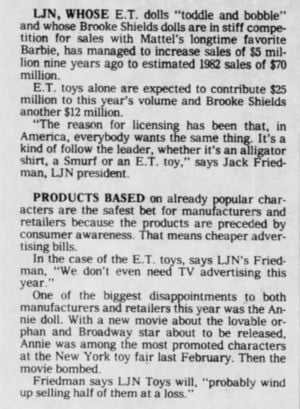
So Tramiel’s lesson was, ‘Built it cheaper and they’ll buy it’ and Friedman’s lesson was, ‘If you put a fucking picture on it that is well known, people will buy it.’ So Jack bought Black Pearl studio. He came into Chicago and he said, ‘You’re making a couple of games for me. I’m going to buy you. What is it going to take?’ And boom, he bought me.
I said, ‘Who am I working for?’ He said, ‘You’re working for me. This is Brian Farrell, he is the CFO. I’m the CEO. There’s this person, this person, and this person.’ I said, ‘Okay, where do I stand in this company?’ He said, ‘You know, I really don’t have a number 2. I have like 3 guys. I have a CFO. You’re going to be like the COO or the VP of game development or whatever, but you’ll be number two under me.’ I said, ‘Okay’. So I get there, I walk in, and then a month after I walk in Jack calls me into his office and says, ‘I’ve decided I’m going to go kick myself upstairs and be chairman of the board and I’ve made Brian Farrell the president’, who is the bean counter. He’s the CFO. I said, ‘Jack, you don’t have to name me as CEO, but naming Brian Farrell who is a fucking accountant who has never played a video game in his life to be the CEO is a real mistake.
Jack kept licensing games. Everything from Wayne’s World to you name it, he was licensing games. You know, Ren and Stimpy. Anytime he saw a license, he would run down to the studios and pay a bazillion dollars to get the license and say, ‘Okay Larry, make a game.’ Well, unfortunately, that doesn’t work all the time. Jack would get tons of new television shows that never panned out and I would be using development resources on these games. The television series would be cancelled after six episodes and now I have a video game based on a television show that’s cancelled. But that was Jack. Anything that he could do that would get a license, he would do. So I was very disillusioned there.
I stayed there for about a year — maybe a little bit more – working for Brian Farrell, who I never cared for much as a person. But I brought Mike Haller in and Mike spoke Japanese, so we introduced him to all the Japanese companies and he started making wrestling games. And they started making quite a good franchise in wrestling [...] and they got the WWF license. So they prospered for several years. But once Haller left and went on to EA and doing other things, Farrell couldn’t run the company. He had no idea what he was doing and the company just folded up. They didn’t know where to go. And they fell off the map. So that was too bad.
